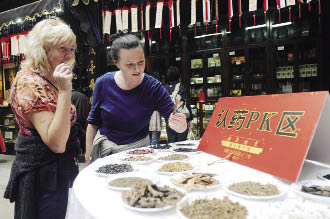EU: Stiffer Quality Requirements for Traditional Chinese Medicine Not All Bad News
By staff reporter LU RUCAI
|
 |
|
Overseas tourists show their interest in herbs at a TCM Festival held in Hangzhou in November 2009. |
IN late 2010 and early 2011, Lanzhou Foci Pharmaceutical Co., Ltd., a manufacturer of traditional Chinese medicines (TCM) in Gansu Province, experienced a sudden heavy increase in orders from Europe. "They were stockpiling medicines because they knew the EU was about to raise the threshold for entry requirements for TCM," Sun Yu realized; he is the company's deputy general manager and head of a cooperation program on TCM between the EU and the company. Sun was right, and the new rule entered effect as of April 1, 2011.
The new threshold for entry requirements refers to the European Directive on Traditional Herbal Medicinal Products (THMPD). Though adopted in 2004, the directive provided for a transition period of seven years for products that had already entered the European market, allowing them to be sold as dietary supplements in the interim. As the time limit has expired, herbal remedies are now required to have authorization before being sold there. To date, no Chinese TCM company has ever successfully registered its products as drugs in the EU.
Facing the Challenge
Foci Company is one of the few Chinese firms that had already started to register their TCM products in the EU. The registration work began in 2009 and the company chose their best-selling Concentrated Pill of Angelica. It was part of a strategic adjustment for the company in the wake of the failure it suffered in 2006 when trying to register a compound medicine.
"Concentrated Pill of Angelica contains only one ingredient – angelica. It's safe and the effects have been identified," Sun explains. Besides that, related research and technical support on angelica have been perfected in China.
Before starting the application process, Foci Company managers met with consultants and experts in the TCM community to analyze the THMPD and determine whether Foci met the requirements stipulated by the legislation, including the one that justifies the simplified registration procedure but dismays many would-be applicants in China – that the registration application must be accompanied by "bibliographical or expert evidence to the effects of the medicinal product in question, or of a corresponding product that has been in medicinal use throughout a period of at least 30 years preceding the date of the application, including at least 15 years within the Community."
Foci, with 80 years in the TCM industry, satisfies the requirement for selling time on the European market, and more importantly, can provide papers of customs clearance and declaration in the Netherlands, Italy and the UK that make medicinal specifications of its products. For most manufacturers however, it is not easy to offer the proper customs forms since it was not uncommon for traditional medicinal products to be exported as food.
The company chose Sweden as its first place for registration. In March 2010, Foci submitted the evaluation materials for Concentrated Pill of Angelica to the Swedish Medical Products Agency. Once reviewed by Swedish experts, the product was accepted as a drug and was then allowed to apply for EU registration.
In July 2010, Foci organized a special application team consisting of staff from its R&D Center and Departments of International Marketing, Production and Quality Control. The company also worked with experts from the China Academy of Chinese Medical Sciences to review the product on the principles of Good Laboratory Practice (GLP). In early March 2011, the improved application documents were submitted to Swedish Medical Products Agency.
"We were told that the result would be available in 200 days. That is to say, our product would be successfully registered by the end of this year at the earliest," says Sun Yu. That's why European importers stocked up on TCM products right before the expiration of the transitional period. From April 1, 2011, only TCM medicines in stock could be sold in Europe.
In response to the Directive, China's Ministry of Commerce, China Chamber of Commerce for Import & Export of Medicines & Health Products and some other related departments convened a meeting with TCM companies at the end of 2010, recommending 11 medicines start the registry process in the EU. Five of them were manufactured by Foci, while Beijing Tongrentang Group Co., Ltd. and Guangzhou Qixing Pharmaceutical Co., Ltd. produced the others.
Guangzhou Qixing Pharmaceutical Co., Ltd. was approved by the simplified procedure for registration of traditional herbal medicinal products in the UK and got the Good Manufacturing Practice (GMP) license. The Di'ao Xinxuekang Capsule produced by Chengdu Di'ao Pharmaceutical Group Co., Ltd. also passed the examination with the Dutch authority and got the EU GMP license.
Opportunities Alongside
Some people regard THMPD as a trade barrier, but Sun Yu doesn't see it that way. "I understand and agree with the EU's act since it offers open and fair opportunities to all herbal drugs." Sun feels this shows an open attitude, allowing applications for registration of herbal medicines through a simplified procedure that does not require clinical test results; it merely archives efficacy data and certifications endorsed by experts. "It is understandable that the EU is concerned about drug safety within its member states. We do not need to oppose this directive." Sun continues: "TCM companies that are trying to find a global market should have an open and cooperative attitude too."
Huang Jianyin, deputy secretary general of the World Federation of Chinese Medicine Societies, also considers the Directive an opportunity for, rather than a blockade against, traditional Chinese medicines. "The Directive offers a legal basis for TCM to be sold as drugs in Europe. At the same time, it opens the door for TCM manufacturers to enter major herbal markets and expand sales channels in Europe."
| 